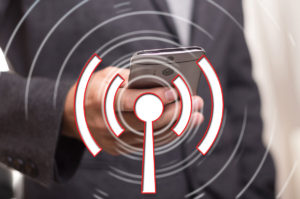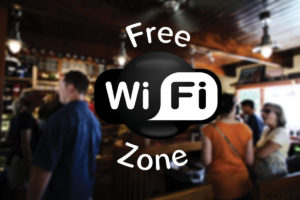Wireless Internet
3/4/2020 Walk into most any coffee shop in downtown Des Moines, and you’ll see laptops open, phones out and patrons typing away.
Walk into most any coffee shop in downtown Des Moines, and you’ll see laptops open, phones out and patrons typing away.
Some will be using their own mobile hotspots, while others will have logged into the business’ public wireless network.
Head to the service station, the car wash or even the doctor’s office, and the same is likely to occur. More and more, customers view access to wireless Internet as a necessity, especially within the hospitality industry, while-you-wait services and other appointment-based businesses, information technology experts say.
Many business owners say wireless, or WiFi, can make wait times seem shorter, distract customers if a service delay occurs, or allow them to do work or conduct online research when necessary.
Information technology advisers, attorneys and other experts say there’s no doubt free wireless service has its benefits, but they also caution how the free network is used and, in some cases, whether to even use it at all.
Should my business offer public wireless?

Ryan Weston is the manager of security and connectivity for Associated Computer Systems Ltd. in Urbandale.
Studies show that businesses that offer free WiFi have customers who stay longer and spend more money. This also helps businesses cut down on hardware and software expenses because a WiFi network allows employees to Bring Your Own Device (BYOD) to work for company business, according to Tech Republic, an online organization of information technology professionals that offers peer-to-peer advice.
Fast, free WiFi also is viewed as a way for businesses to stay competitive and brand their network with the use of the business’ name as a user logs into the WiFi network, according to Business Insider.
The Internet world is rapidly increasing as consumer demands increase. Wireless hotspots are expected to grow four times from 169 million in 2018 in North America to almost 628 million by 2023, according to the annual Internet usage report released in February by Cisco Systems Inc., a multinational technology company.
During that same timeframe, networked devices and connections will increase from 3 billion to 5 billion, 75 percent of all mobile devices will be wired or connected over WiFi, and broadband and WiFi speeds will increase.
Public wireless is a benefit to offer customers from a public relations perspective, says Ryan Weston, the manager of security and connectivity for Associated Computer Systems Ltd. in Urbandale. He says he has some friends and family members who won’t shop at businesses unless they offer public wireless.
Many mobile carriers provide 4G Internet service, but some WiFi connections can still provide faster speeds and usually aren’t subject to usage limits. WiFi also can be offered where 4G access isn’t available and for laptops, tablets and mobile devices that aren’t equipped with it, according to PC World.
That’s why Mason Zimmerman has given out the password to the WiFi network at Crossfit in Norwalk, where he works and manages the gym.
“It keeps their kids occupied,” Zimmerman says of his clients who bring their children to the gym while they work out.
Is public wireless safe?
While Weston says patrons like the convenience of public wireless networks, he advises users not to log in. Instead it is better to use the company’s hotspot or their own personal hotspot, which decreases the risks of a virus, ransomware, malware or another type of hacker attack.
Business owners also need to limit access to their own existing WiFi network and have a separate one for guests or the public. Otherwise, allowing outsiders on the private, internal network could put the company at risk to hacks or data theft.
Weston says business owners also need to have a firewall in place that filters content and controls bandwidth. This will stop downloads of illegal content, copyright material or pornography. The protection also can stop someone from trying to hack into the network, the business’ cash register, its Square account or other proprietary information. The guest network will run on a separate IP address. The bandwidth control will prevent one or a few users from streaming videos or any other item that could bog down the network.
A business owner will need to continue to monitor its firewall and keep it up to date with any new updates or patches similar to how they would with an antivirus software program, Weston says.
Zimmerman doesn’t have a separate network for guests, so he says he has noticed that, when numerous users are using his business’ WiFi, it slows down. There could be 10 to 15 people logged onto the wireless at any given point. During those times, it’s caused his Spotify music streaming to delay in loading or lose its connection.
Zimmerman says he doesn’t have a terms of use for guests who access the WiFi network and hadn’t thought about security issues until being interviewed for this article. He provides the wireless to his clients and their children as a way to help them keep their kids occupied and out of harm’s way so the parents can be engaged and focused on their workout.
What type of wireless should my business offer?

Brian McCormac, an attorney with BrownWinick Law, practices business, data security and privacy law.
Weston suggests a business have three wireless networks: one for guests, one for employees who bring their own devices for work, and one for the business itself. This will help prevent employees from bringing in a virus from their own network or another network they’ve been connected to or opening a ransomware attack on their device that will filter into the company’s network. A guest wireless connection also will help prevent a hacker from infiltrating the business’ network through the wireless system.
Many cities have followed in the steps of private businesses and started to offer free public wireless in their facilities. Within the metro area, these include the cities of Clive, Des Moines, Urbandale and West Des Moines, according to the Iowa League of Cities.
Patrons to the West Des Moines Library have access to free public wireless, per the library’s usage policy, says Lucinda Stephenson, who oversees communications for the city.
PC World suggests business owners also consider their budget for Internet usage, their current Internet setup, who will be able to use the Internet, how many users are likely to be using WiFi at once and whether other systems such as a phone also will be connected to the WiFi.
Small businesses can receive 40 megabytes per second of wireless Internet per month for about $65, plus the cost of the modem and installation, according to CenturyLink’s website. Packages offering faster speeds, more networks or a phone line can cost more.
What kind of policies should my business have in place?
 The West Des Moines Public Library offers wireless Internet access to patrons. Users must follow set guidelines in its computer/Internet use policy:
The West Des Moines Public Library offers wireless Internet access to patrons. Users must follow set guidelines in its computer/Internet use policy:
• They have a wireless network interface card
• They have the ability to configure the laptop to use the library’s connection
• Anyone using audio or video also uses headphones
• The library’s employees will not assist customers with configuring their computer to connect to the wireless because of the liability of handling non-library equipment
All use of the wireless network also requires users to follow the library’s conduct policy, which prohibits people from engaging in conduct that disturbs or interferes with use of the library. This includes use of any audio, personal communication or computing device that disturbs other patrons, or the exposure of patrons and staff to offensive images or language.
Before a business offers a public wireless network, Weston suggests they develop several policies and consider who will use the network.
An acceptable use policy is also necessary to require any user on either the employee or the public wireless network to adhere to the company’s terms of use. Guests will be asked to review the policy and click a box to agree to the terms and proceed with use of the network. The business also will want to have an incident response plan in place that details what action will be taken if the business’ networks have any sort of security breach, Weston says.
Anytime an employee leaves a company, the business should change all passwords including that to the wireless network to ensure the individual can no longer log in and have access to the network.
“That’s really an important one to make sure to change,” Weston says.
It’s difficult to impose liability on a business that provides free Internet service, but the business can take additional steps to ensure it is protected should a user download inappropriate material, says Brian McCormac, an attorney with BrownWinick Law, who practices business, data security and privacy law.
“It’s a best practice for businesses to require users to acknowledge a terms of use before they can access the free network,” he says.
These terms will prohibit the download and use of copyrighted material or indecent materials such as pornography and will require users to agree to these terms before they receive access to the public wireless network.
“Businesses should also provide a warning that the network is not secure, and the user should not send confidential or private information through this service,” McCormac says. “The warning that this is not secure is clearly important in that regard to limit liability.” To further limit liability, businesses should also consider using filtering technologies to prevent users from accessing inappropriate content.
The Digital Millennium Copyright Act provides a safe harbor for Internet service providers, which generally shields companies such as Mediacom or CenturyLink from liability for the unlawful downloading of copyrighted materials. This safe harbor could also protect businesses offering free public Internet access, McCormac says.
“The law acknowledges it’s pretty hard to control what users are doing on an Internet service,” he says, adding that, in order to qualify for the safe harbor, a business must take several steps, including having a user policy and terms of use in place. ♦




















